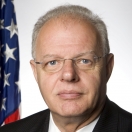
Last week, here in my blog, I discussed cybersecurity as a shared responsibility that requires each of us to do our part, whether that means ensuring we use strong logins or have up-to-date anti-virus software on our home computers and regularly install updates and patches for the applications we use; exercising care in conducting our online activities; or making sure our business systems are properly configured and safeguarded. But the shared responsibility to secure cyberspace doesn’t end at our borders.
To a large extent, many of the remarkable economic, social, and cultural benefits we derive from the Internet stem from its global reach and how it connects people around the world in a common virtual community. Yet the same interconnected information and communications systems that make this possible also create interdependencies among the networks – and the people who use them. Making our shared cyberspace more secure and trustworthy requires us to work with our partners in the international community, both one-one-one and in regional and global organizations, to build greater collaboration to address cybersecurity risks. This requires action across a wide range of disciplines including research and development, and technical standardization to improve the information and communication technology (ICT) infrastructure; law enforcement cooperation; cyber incident response; initiating dialogue to build greater understanding on acceptable conduct in cyberspace; and, capacity building initiatives to assist countries that are only now starting to realize the full benefit of the Internet.
Fortunately, an increasing number of nations, international organizations, and members of the private sector share our view of the importance of this issue and are eager to collaborate to address the challenges and realize the opportunities. Canada, for example, is observing its own Cybersecurity Awareness Month this October. As I write this, our good neighbor to the south, Mexico, is hosting the International Telecommunication Union (ITU) Plenipotentiary Conference. This quadrennial treaty conference has brought together an estimated 2000 delegates from 160 countries and 40 organizations to discuss a range of issues relating to the international ICT environment, and cybersecurity is figuring prominently on the agenda. But improving global cybersecurity involves more than just government action. It also includes efforts by our private sector partners, who do business in a global marketplace, working with the U.S. and other governments as well as their business counterparts. For example, the U.S. delegation to the ITU Plenipotentiary includes 30 private sector participants. They are representatives of global companies working to enhance the deployment of ICT around the world as well as encourage an appropriate focus on cybersecurity.
In cooperation with other relevant groups like the International Organization for Standards (ISO) and the Internet Engineering Task Force (IETF), as well as other multilateral and regional organizations, the ITU can make a valuable contribution to reducing vulnerabilities in the global infrastructure through its telecommunications standardization activities and in helping developing countries adopt a culture of cybersecurity. There are a number of other complementary events that will be held this October, such as the Asia Pacific Economic Cooperation Telecommunications and Information Working Group Ministerial Meeting. Each of these serve to reinforce the importance of our shared responsibility in the international community.
Howard A. Schmidt is the Cybersecurity Coordinator and Special Assistant to the President


